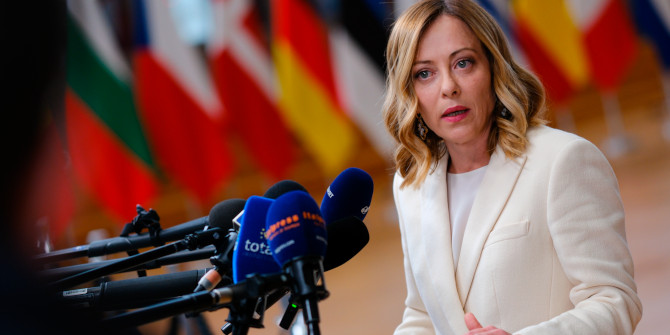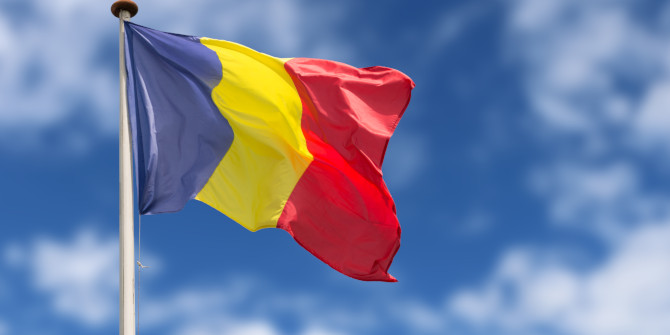Ireland will hold its European Parliament election on 7 June alongside local elections. Rory Costello writes that the emergence of immigration as an election issue has led to a fall in support for Sinn Féin, while independent candidates look set to receive a large share of the vote.
This article is part of a series on the 2024 European Parliament elections. The EUROPP blog will also be co-hosting a panel discussion on the elections at LSE on 6 June.
At the start of this year, it looked as though this European election would deliver a resounding victory for the left-wing nationalist party Sinn Féin (a member of the GUE group). Election forecasts predicted they would win 4 of Ireland’s 14 seats in the European Parliament, more than any other party.
Sinn Féin had already achieved their best-ever result in the last general election in 2020, forcing traditional rivals Fianna Fáil and Fine Gael into a coalition government (along with the Greens) for the first time. This gave Sinn Féin a platform as the leader of the opposition from which it could further increase its support, and it capitalised on widespread dissatisfaction with the government in addressing Ireland’s severe housing shortage.
The emergence of immigration as an election issue
In recent months, however, Sinn Féin has experienced a sharp decline in support, according to polls. It’s a familiar story: support for the main left-wing party drains away among working class voters when immigration becomes politicised. Ironically, the housing crisis that had driven voters to Sinn Féin initially also made it easier for far-right parties and activists to make immigration a salient issue.
Ireland has one of the fastest growing populations in the EU, mostly driven by immigration. While much of this immigration is for employment and education, there has also been a significant increase in the number of refugees and asylum seekers coming to Ireland (Ireland has received around 100,000 Ukrainian refugees since 2022 and there has been a 75% increase in international protection applicants this year).
Far-right activists have been involved in organising protests around the country in opposition to asylum seekers. There were anti-immigrant riots in Dublin last November, and dozens of arson attacks on properties designated for housing asylum seekers. All of this has pushed the issue of immigration high up on the political agenda.
A number of far-right parties have emerged in Ireland in recent years, but to-date none has had any electoral success. It seems unlikely that any of these parties will win a seat in this European election, despite the growing salience of the issue of immigration.
The reason is that voters who are motivated by opposition to immigration appear to be drawn more to independent (i.e. non-party) candidates who have expressed concerns about immigration than to the less palatable far-right parties. Some of these independent candidates are in with a chance of winning a seat, but overall, the anti-immigration vote is quite dispersed among various rival candidates, which will reduce its impact.
A fragmented political landscape
With Sinn Féin losing ground, the political landscape in Ireland looks extremely fragmented. Opinion polls focusing on the European Parliament election suggest that the three largest parties – Sinn Féin, Fine Gael (EPP), and Fianna Fáil (Renew Europe) – are each supported by roughly 20% of the electorate. A similar percentage of voters support independent candidates (of various hues), while the remaining vote is split among several small parties including the Green Party, the Labour Party, the Social Democrats and various far-left and far-right parties.
The Green Party are currently the third member of the government coalition, and as so often happens to junior coalition partners, they have lost significant support during their time in government. The Green Party achieved their best-ever election result in the 2019 European Parliament election, but they are expected to lose at least one of their two seats this time out.
One of the most notable features of Irish politics right now is the strength of independents. Independents have always been a feature of Irish politics, facilitated by the permissive electoral system, and independents have traditionally done well in European Parliament elections. What is striking about recent polling is that independents as a group attract as much or more support than the biggest political party. This speaks to an anti-party and anti-politics mood among Irish voters. Three of Ireland’s current MEPs are independents, and this could potentially increase in this election.
European and local issues
Like many member states, European Parliament elections have usually been treated as second-order national elections in Ireland. The fact that they are held concurrently with elections for local councils reinforces the tendency for domestic issues to dominate. Also, the pro-EU consensus among the main political parties and the public (confirmed by the most recent Eurobarometer survey) diminishes the extent to which conflict over Europe features in the campaign.
There are signs, however, that issues with a European dimension are now beginning to occupy a bigger place on the agenda in European election campaigns than previously. The controversial EU migration pact, on which Ireland has the right to opt-in or out, has featured prominently in many of the election debates. So too have environmental and agricultural issues such as the Nature Restoration Law and the Nitrates Directive (for which Ireland has a derogation).
The EU’s position on the Israel-Hamas war has also featured in the campaign, although on this issue there is a broad consensus among the parties that the EU should take a harder line on Israel. However, these issues tend not to be the things that voters are raising on the doorsteps as candidates campaign around the country. Perhaps giving the European Parliament election its own date in the calendar, without lumping it in with local elections, is necessary for voters to truly treat it as a European rather than domestic contest.
Note: This article gives the views of the author, not the position of EUROPP – European Politics and Policy or the London School of Economics. Featured image credit: Alexandros Michailidis / Shutterstock.com






